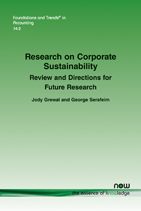Research on Corporate Sustainability: Review and Directions for Future Research
By Jody Grewal, Assistant Professor, University of Toronto, Toronto, Canada, jody.grewal@rotman.utoronto.ca | George Serafeim, Charles M. Williams Professor of Business Administration, Harvard Business School, Boston, USA, gserafeim@hbs.edu
Abstract
We review the literature on corporate sustainability and provide directions for future research. Our review focuses on three actions: measuring, managing and communicating corporate sustainability performance. Measurement is the least developed of the three and represents promising opportunities for research. Compelling evidence now exists on the role of management control systems, investor pressure and mandated disclosure in improving corporate sustainability outcomes. Research has moved beyond weighing the importance of all sustainability issues equally, with recent studies drawing distinctions between the financial materiality of different sustainability issues. Collectively, this new line of inquiry suggests that improving performance on material sustainability metrics is related to improved financial performance, helping to resolve four decades of inconclusive evidence on the relation between sustainability and financial outcomes. Finally, we review research on how disclosure mediums, accounting standards, information monitors and intermediaries shape the communication of sustainability performance. We conclude with a call for research on how to measure performance in the 21st century when corporate purpose extends beyond shareholder value maximization.
Research on Corporate Sustainability: Review and Directions for Future Research
Research on Corporate Sustainability provides an overview of key papers in the corporate sustainability literature and directions for future research. It is structured on three key themes: measuring corporate sustainability performance; managing corporate sustainability performance and how in turn corporate sustainability performance might improve corporate financial performance; and communicating corporate sustainability performance. The monograph concludes with a provocative section articulating a hypothesis that the concept of performance measurement is inherently flawed and the authors discuss a host of efforts and commentators that question whether the purpose of the corporation is to maximize shareholder value. According to this emerging viewpoint, the purpose of the corporation is much broader, multi-dimensional and focuses on providing solutions to the world’s pressing problems in a profitable way. The authors put forward that for this new concept of the purpose of the corporation to be authentic, legitimate and efficient, one needs to be able to measure social impact and reflect that in financial statements. The outcome of this process would be impact-weighted financial accounts that allow business decision makers to optimize risk, return and impact.
